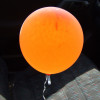Limit deep-sea fishing by depth
Restricting deep-sea fishing to shallower than 600 meters could improve conservation of the marine ecosystem and improve commercial gain, according to research published this week inCurrent Biology.
conservation of the marine ecosystem and improve commercial gain, according to research published this week inCurrent Biology.
A team of scientists led by Jo Clarke from the University of Glasgow showed that damage to marine ecosystems caused by deep-sea fishing increased from 1978 to 2013. Importantly, commercial gain also declined over the same period.
Using records of marine species captured by scientific trawl surveys, they show that the magnitude of environmental impact is largely dependent on depth.
Current methods of encouraging sustainable fishing involve restricting the 'total allowable catch' of certain species, however this is associated with 'by-catch' of vulnerable species such as sharks.
Between 600 and 800 meters depth, the amount of discarded 'by-catch' is much higher relative to commercially valuable biomass.
Deep-sea species generally have fewer offspring than shallower dwelling species and are consequently more vulnerable to over-fishing. This has resulted in a number of deep-sea fisheries being regarded as unsustainable. Since deep-sea fishing in the northeast Atlantic commenced in the 1970s, the abundance of commercially valuable fish species has declined.
欧盟ropean Union are currently working to develop regulations that will manage deep-sea fishing more effectively than present methods. Restricting deep-sea fishing to shallower than 600 meters may provide the solution.




Comments
Add a comment